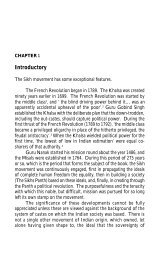Fundamentalism and the Sikh Religious Tradition by T.N. Madan
Fundamentalism and the Sikh Religious Tradition by T.N. Madan
Fundamentalism and the Sikh Religious Tradition by T.N. Madan
You also want an ePaper? Increase the reach of your titles
YUMPU automatically turns print PDFs into web optimized ePapers that Google loves.
Maya (Multifarious things <strong>and</strong> beings), <strong>and</strong> fourth, <strong>the</strong> next higher stage of <strong>the</strong> Gurmukh<br />
who lives truthfully." In fact, <strong>the</strong> recommendation is for a continuous moral effort. It is<br />
wrong to say that Guru Nanak recommended only listening to <strong>the</strong> holy word. In fact, no<br />
one emphasizes <strong>the</strong> importance of 'deed' more than does Guru Nanak who says that man's<br />
assessment shall be based on his deeds, "truthful conduct is <strong>the</strong> highest form of living,'<br />
<strong>and</strong> that one remains near or away from God according as is <strong>the</strong> character of one's deeds."<br />
The problem Secularism has created, is that having discarded <strong>the</strong> internal brakes<br />
that religion gave lo society, it has been unable to devise <strong>and</strong> instil in man any rational<br />
ethics that could create cohesion in a society. The factual position is that despite <strong>the</strong><br />
warning <strong>the</strong> authors of Limits of Growth, gave a quarter century back, <strong>the</strong> gap between<br />
<strong>the</strong> rich <strong>and</strong> poor of a country, <strong>and</strong> between <strong>the</strong> developed <strong>and</strong> undeveloped countries,<br />
has grown at an alarming rate. The present thinking seems to involve "<strong>the</strong> annihilation of<br />
mythology, religion, all value system, all hope." The problem appears to be not of any<br />
seeming fundamentalism, but of Secularism, <strong>and</strong> its inability to create a commitment of<br />
<strong>the</strong> people to a rational ethics, much less to a univresal ethics.<br />
Pacificism <strong>and</strong> Indian Context : Here a few words about pacificism, <strong>and</strong> its<br />
ethical base or value. The present century has known for two great pacificists, namely,<br />
Bertr<strong>and</strong> Russell in <strong>the</strong> field of thought, <strong>and</strong> Mahatma G<strong>and</strong>hi in <strong>the</strong> field of religious<br />
conviction. During <strong>the</strong> First World War, Russell faced imprisonment; but after <strong>the</strong><br />
Second World War <strong>the</strong> same pacificist Russell suggested that in order to avoid <strong>the</strong><br />
appalling disaster of a Russian Victory, a threat of force or even actual use of force<br />
should be employed against <strong>the</strong> USSR, before it could develop a big stock pile of atom<br />
bombs <strong>and</strong> became a threat to <strong>the</strong> West. To an outsider, <strong>the</strong> moral difference between a<br />
pacificist Russell, who recommended a strike against Russia, <strong>and</strong> a Ronald Reagan who<br />
called it an 'evil empire', is hardly visible.<br />
Next is <strong>the</strong> question of Mahatma's combining religion <strong>and</strong> politics, <strong>and</strong> his<br />
pacificism. Combination between <strong>the</strong> two was always practised <strong>by</strong> Mahatma G<strong>and</strong>hi. His<br />
incongruities in this regard, are too obvious to be ignored. He endorsed <strong>the</strong> st<strong>and</strong> of <strong>the</strong><br />
Akalis, whom <strong>Madan</strong> calls Fundamentalists, when <strong>the</strong>y freed <strong>the</strong>ir gurdwaras from <strong>the</strong><br />
control of Government patronised Mahants. Yet, he was inexplicably upset, when <strong>the</strong><br />
Akalis started <strong>the</strong> Jaitu morcha, although he himself wanted <strong>the</strong> Akalis to join his<br />
political movement against <strong>the</strong> British, whom <strong>the</strong> Akalis had confronted at Jaitu. And<br />
again, when it suited him, he joined <strong>the</strong> Khilafat Movement, which was politically extraterritorial.<br />
We have noted how he introduced Hindu ideology in <strong>the</strong> Congress, which was<br />
turned lo looking back to <strong>the</strong> Hindu past.<br />
He recommended pacificism to <strong>the</strong> British, when faced with an impending attack<br />
from Hitler's Germany. Seervai, <strong>the</strong> unparalleled Constitutional lawyer of India, has<br />
made a detailed analysis of <strong>the</strong>se facts <strong>and</strong> events, <strong>and</strong> come to <strong>the</strong> conclusion that<br />
Mahatma's faith in non-violence was just superficial, far from being serious. He writes,<br />
"There is little doubt that G<strong>and</strong>hi used non-violence as a political weapon, <strong>and</strong> was<br />
prepared to support or connive at violence to secure political goals. Anyway, it is well<br />
known that later he not only promised to promote <strong>the</strong> war effort, if India were given<br />
autonomy, but also blessed <strong>the</strong> dispatch of Indian Army to Kashmir in 1947. Abul Kalam<br />
Azad's views about Indian <strong>and</strong> Mahatma's pacificism are not very different.<br />
The Mahatma stressed that Pakistan would be created on his dead body, <strong>and</strong> yet<br />
it left Abdul Ghaffar Khan aghast, when G<strong>and</strong>hi supported <strong>the</strong> Congress Resolution
















